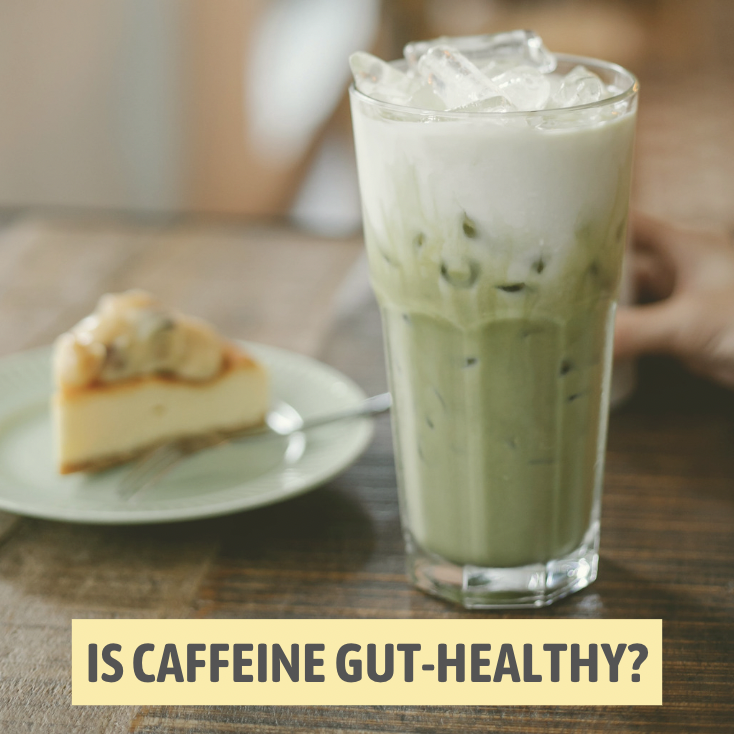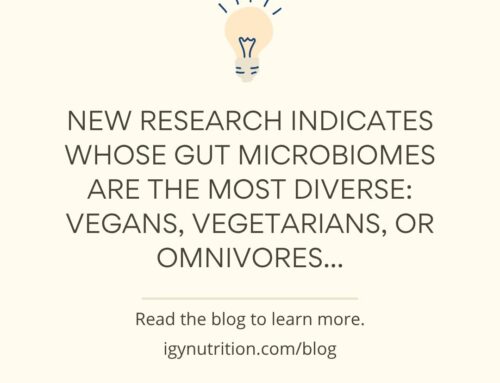What’s the deal with gut health and caffeine? Like most things, there are pros and cons. Caffeinated drinks affect motility, contain anti-inflammatory polyphenols, and may affect the gut microbiome.
Let’s find out more about caffeine and the gut below. Stick around until the end for some gut-healthy caffeinated drink recipes.
Caffeine and Motility
If you have ever consumed a large coffee and found yourself running to the bathroom a few minutes later, you know what we mean when we mention coffee’s effects on motility. That’s a classic example of a motility ramp-up.
Motility refers to the speed at which your body digests and expels food. Fast motility might look like going number two several times a day (think diarrhea). Slow motility might look like going every few days (think constipation).
We want to find a happy medium with motility: not too fast and not too slow.
Since caffeine speeds up motility, it might be helpful for someone who experiences constipation or slower motility (Source). However, if you’re someone who deals with diarrhea or fast motility, too much caffeine might be a pain in the butt (literally) for you. Experiment with different amounts to find your caffeine happy place.
Caffeine and Polyphenols
Typical sources of caffeine tend to contain copious amounts of polyphenols. Polyphenols are chemical compounds found in plant foods that reduce inflammation by fighting off free radicals. They are particularly supportive of gut health (Source).
Coffee is the largest source of polyphenols in the American diet (Source). Surprising, right? Coffee comes from the coffee bean, which is rich in these anti-inflammatory polyphenols. Other sources of caffeine, like black tea or matcha green tea, are potent sources of polyphenols, too (Source).
If caffeinated drinks are your primary source of polyphenols, it might be a good idea to keep drinking them. Here are some great caffeinated drink recipes.
Caffeine and the Microbiome
Preliminary studies associate caffeine sources like coffee with higher counts of beneficial gut bacteria strains like Bacteroides. Increased counts of beneficial bacteria are usually helpful for gut health.
But we aren’t sure if coffee drinkers have healthier gut microbiome compositions than those who don’t drink coffee. As far as we know, there isn’t much research on that topic yet. Plus, it would be challenging to study since coffee drinkers’ diets vary drastically. We’ll let you make your own guesses on that one.
Either way, these preliminary studies seem to suggest that coffee might support your microbiome – and it doesn’t seem that coffee harms it.
Avoiding the Shakiness
Some of you might be thinking, well, caffeine makes me shaky. Is there a way I can acquire its benefits without bouncing off the walls? Yep!
Some people metabolize caffeine very quickly, while others take a while to process it. Those who metabolize caffeine quickly often experience shakiness upon consumption. Your rate of caffeine metabolization is determined mainly by genetics (Source).
A plant-derived compound called l-theanine can help with that. It slows down caffeine metabolism. When combined with caffeine, l-theanine gives users a gradual, steady pump over several hours rather than the burst and crash associated with energy drinks and coffee (Source).
Are you looking for l-theanine? Try matcha green tea. It’s rich in both caffeine and l-theanine.
Caffeine: It’s All About the Source
The trick with caffeine is ensuring that you’re consuming a healthy source of it. Many sources of caffeine contain whopping amounts of added sugar, artificial additives, and non-organic dairy.
As much as we love them, we can’t defend Red Bulls and caramel macchiatos with extra whipped cream from Starbucks. The damage artificial additives and added sugar confer on the gut outweighs the benefits caffeine grants it.
There are ways to make caffeine tastier than straight black coffee, though. Check out our caffeinated drink recipes below!
Lattés
Matcha Green Tea Latté
Ingredients:
- One tbsp matcha green tea powder
- One tbsp stevia
- 1 ½ cups milk of choice (we recommend coconut or oat milk)
Directions:
- Use a latté spinner or blender to mix your milk, green tea, and stevia. Top with sugar-free whipped cream and shredded coconut. Serve hot or cold.
Classic Latté
- One cup coffee
- One tbsp stevia
- One cup of milk of choice
Directions:
- Use a latté spinner or blender to mix your milk, coffee, and stevia. Top with sugar-free whipped cream. Serve hot or cold.
Caffeinated Protein Shakes
Matcha Green Tea Protein Shake
Ingredients:
- One tbsp matcha green tea powder
- One tbsp stevia
- 1 ½ cups milk of choice (we recommend coconut or oat milk)
- One scoop of vanilla protein powder
- Preferably low-sugar and additive-free
- ½ cup ice
Directions:
- Use a latté spinner, blender, or blender bottle to mix your milk, green tea, protein powder, and stevia. Top with sugar-free whipped cream and shredded coconut.
Mocha Latté Protein Shake
- One cup coffee
- One tbsp stevia
- One cup of milk of choice
- One scoop of chocolate protein powder
- Preferably low-sugar and additive-free
- ½ cup ice
Directions:
- Use a latté spinner, blender, or blender bottle to mix your milk, coffee, protein powder, and stevia. Top with sugar-free whipped cream.
Caffeinated Smoothies
Matcha Green Tea Smoothie
Ingredients:
- Two tbsp matcha green tea powder
- One tbsp stevia
- Two cups of milk of choice (we recommend coconut or oat milk)
- One scoop of vanilla protein powder
- Preferably low-sugar and additive-free
- One frozen banana
- ½ cup frozen strawberries
Directions:
- Mix your milk, green tea, protein powder, and stevia using a blender. Then, add your fruits and blend again. Top with sugar-free whipped cream and shredded coconut.
Mocha Smoothie
Ingredients:
- One cup coffee
- One tbsp stevia
- One cup of milk of choice
- One scoop of chocolate protein powder
- Preferably low-sugar and additive-free
- One frozen banana
Directions:
- Mix your milk, coffee, protein powder, and stevia using a blender. Then, add your fruits and blend again. Top with sugar-free whipped cream.
Caffeinated Snacks
Three-Minute Matcha Green Tea Oatmeal
Ingredients:
- ¾ cups oatmeal
- One banana
- Two tbsp almond butter
- ¾ cups milk of choice
- One tbsp matcha green tea
- One tbsp stevia
Directions
- Mix your oatmeal, green tea, and stevia in a bowl. Add your milk and heat in the microwave for 30 seconds.
- Take it out of the microwave and add your banana. Heat in the microwave for another minute. Top with almond butter.
- Let it cool and enjoy!
Mocha Chia Seed Pudding
Ingredients:
- 6 tbsp chia seeds
- ¾ cup coffee
- ¾ cup oat milk
- One tbsp stevia
- Two tbsp cacao powder
Directions:
- Mix your coffee, oat milk, stevia, and cacao powder with a latté spinner or blender.
- Add your chia seeds and mix.
- Put it in the refrigerator for at least two hours.
- Remove from the fridge, add low-sugar whipped cream, and enjoy!
Thanks for joining us today, and great luck on your digestive wellness journey! Which of these caffeinated drink recipes is your favorite? Tag us in a photo of it on Instagram @igynutrition.




